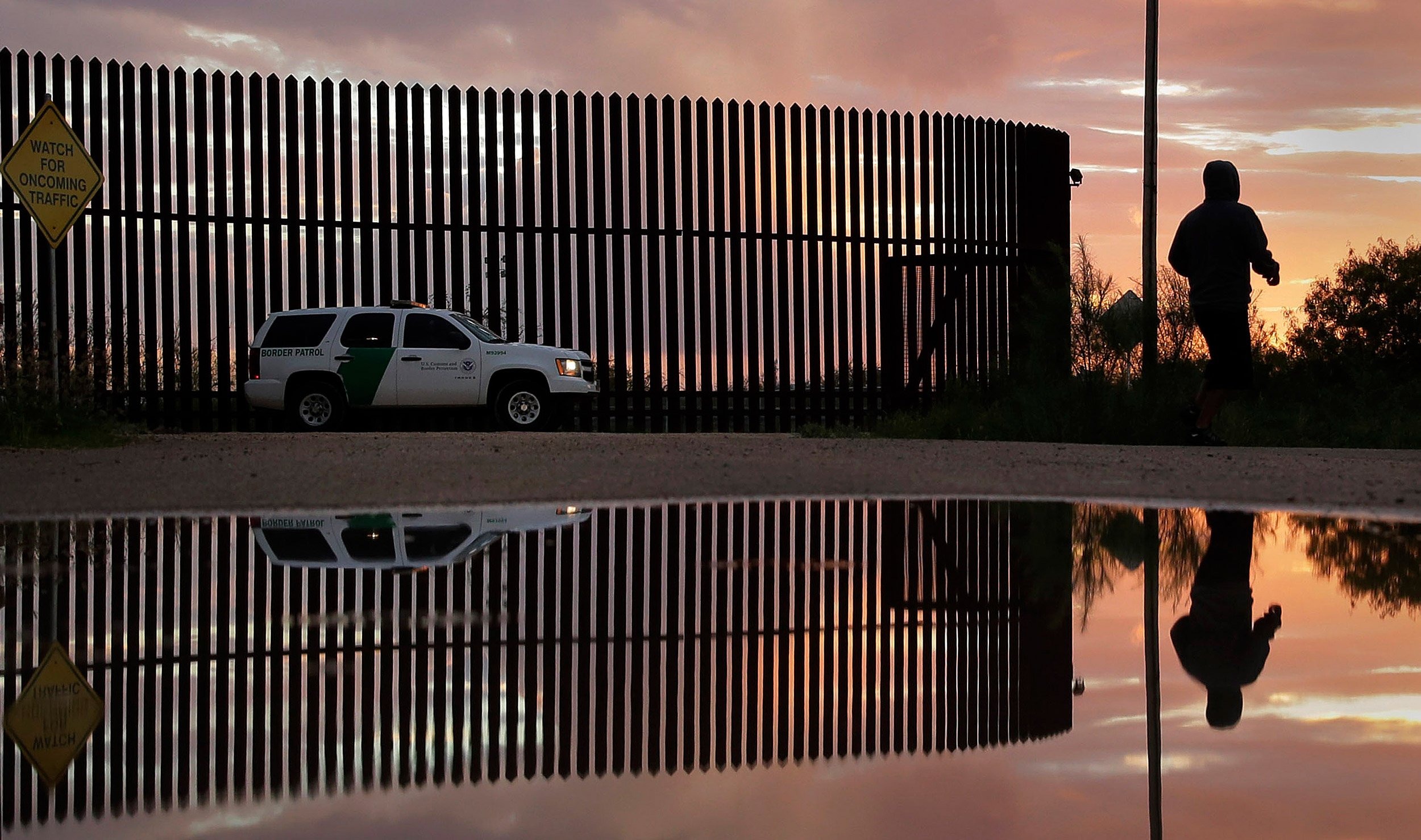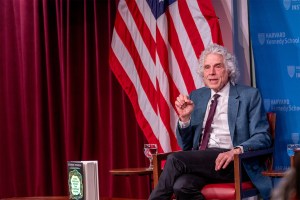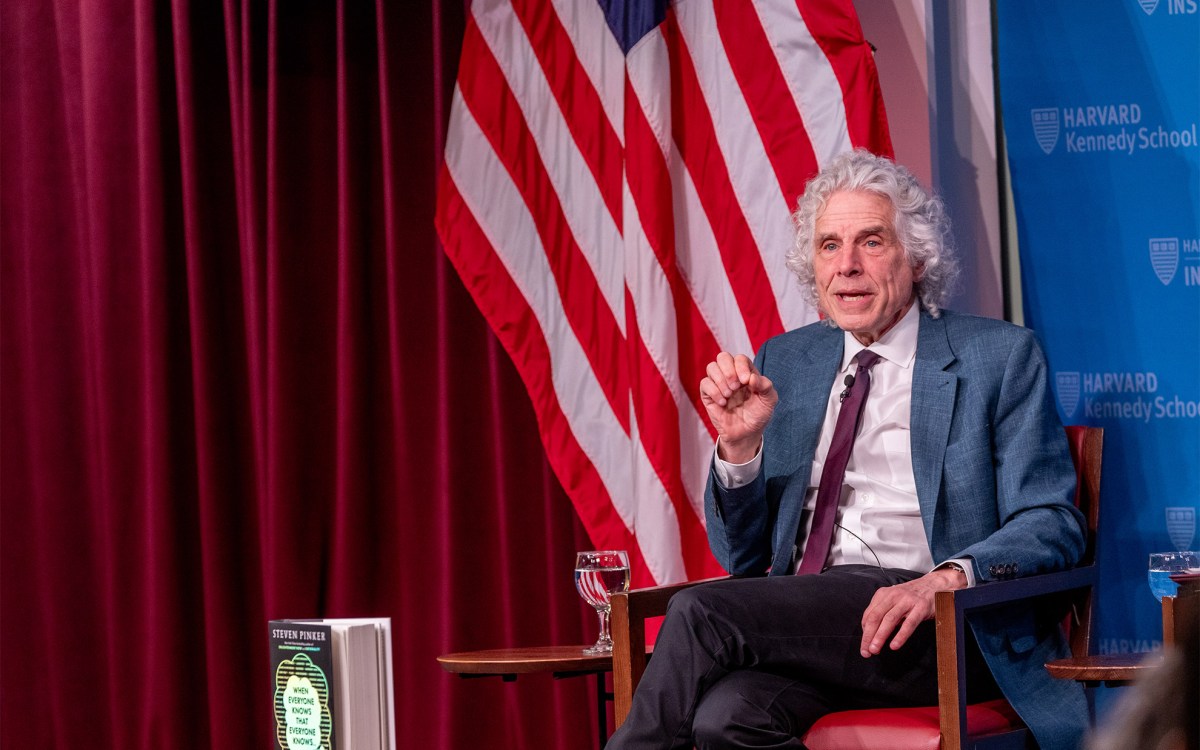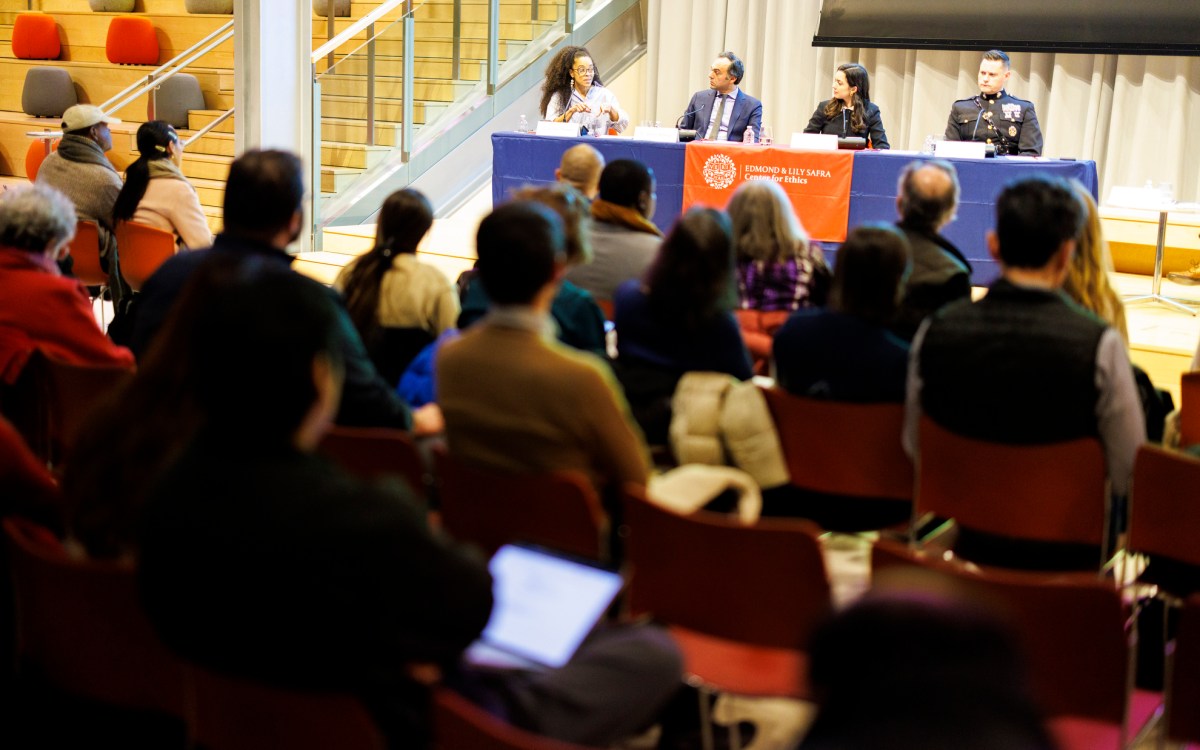
AP Photo/Eric Gay
Whither that wall
Trump may be able to build it, Harvard analysts say, but then the ripples will widen
What started as a touchpoint for presidential candidate Donald Trump to visualize immigration concerns has become the linchpin behind a government shutdown and a possible legal challenge to sweeping presidential power.
In calling for Congress to appropriate $5.6 billion to build a wall along the Mexican border to stanch what he called a “growing humanitarian and security crisis” of illegal migrants and smuggled drugs, President Trump declined to sign budget legislation after the 113th Congress rejected his full request last month. That prompted the shutdown, which will soon be the longest in U.S. history.
To complete the border wall, if lawmakers do not capitulate, Trump has threatened to declare a national emergency to circumvent congressional opposition and gain access to Defense Department funds. Though the legality of such a move is in dispute, in the short term such a declaration could give the president vast additional authority to seize private property, redirect federal funds, and order the military to work on border projects.
To understand the breadth of the issues involved and where the stalemate may lead, the Gazette spoke with Harvard faculty members Juliette Kayyem, Mark Tushnet, Alan Bersin, and Elaine Kamarck. Here are their thoughts.
Juliette Kayyem
Belfer Lecturer in International Security at Harvard Kennedy School (HKS)
Former assistant secretary for intergovernmental affairs at the Department of Homeland Security (DHS) during the Obama administration; and a strategic-security consultant and analyst
A “disturbing move,” but no threat to government
Historically, the invocation of an emergency would be done during a moment of real crisis, say a terror attack or hurricane or pandemic, and would unleash certain authorities, in particular the distribution of money — but also more draconian things like the taking of property or the limitations of people’s ability to move during a quarantine situation. Such declarations have been checked historically, mostly by norms that leaders would not abuse this power and, if they did abuse it, by the courts. My sense is that the president now is looking to use emergency powers at a time when there’s not an emergency, and therefore the administration is heading down the road of essentially lying about the nature of the crisis at the border, the rapes and looting, and the hostage-taking of women — everything he mentioned [in his televised address] — because it doesn’t have the numbers to justify emergency action.
While I think that such a declaration would be disturbing and norm-busting, as well as a sign that the president has essentially pushed himself into a [political] corner, I am not of the school that, if he invokes it, we would be heading toward totalitarianism, mostly because there would be litigation. It wasn’t even clear what he would do with those emergency authorities. So, while disturbing, it’s for me disturbing in the political context more than anything else.
Gauging problems, emergencies, and crises
In crisis management, there are three different categories. One is the problem itself: “Inner city schools aren’t working,” or “too many people don’t have access to health care.” These are problems in the sense that public policy either has gaps or is not working as effectively as it should. The second involves an emergency. That is defined as a disruption that impacts your standard operating procedure, but that is anticipated or you could predict, such as a fire or even a cyberattack. Presumably, you’ve put in place systems that would attack that sort of disruption. Emergencies are short-term. A crisis is an event that so undermines or destabilizes the capacity for an institution to address it that you have to reinvent the reaction and what the institution will do. As someone who has worked on border enforcement, we’ve always had the challenge of undocumented immigrants coming across. We have the benefit that fewer are coming across the border right now, and we have the challenges of a humanitarian crisis because more families are coming now. But none of those things are unanticipated, and those things can be addressed through the democratic process that we have now — which is either change your policy or change your laws.
The border balance between security and flow
Two things you have to remember with border and immigration issues: The first is, the U.S. is a magnet for a lot of complex reasons that have almost nothing to do with our immigration policies. The second is, as I teach in my homeland security course, while we have to focus on security, the challenge for American border enforcement is naturally to focus on what I call the “secure flow” of people, goods, ideas, and networks. We want borders that are moving, in a figurative sense, that millions of people are crossing, where commerce is vibrant and lucrative, all the things that make this country about movement. So while, yes, there’s always something else you can do, a perfect border is not the goal. It is some balance between security and flow, which is always going to be a work in progress, depending on what the threat is. The bigger threat now is not terrorism, it’s cybersecurity.
Mark Tushnet
William Nelson Cromwell Professor of Law
Harvard Law School
Courts would allow leeway, but then there’s the public
If we think about what the courts would say if the president declared an emergency, the answer would be that the courts will give the president a great deal of discretion and leeway in his evaluation of whether there is an emergency. That’s different from asking whether, as a fundamental constitutional matter, there are standards for determining whether there’s an emergency and, in particular, whether a president can declare an emergency without having substantial reasons for characterizing the situation as requiring immediate, urgent attention. The courts will enforce this standard. As a matter of fundamental constitutional principle, the president has to offer reasons to the public explaining why this is something that requires urgent attention. He would have a decent case defending [an emergency] declaration in court. He clearly has more difficulty defending it before the public — and the latter is constitutionally relevant.
Property owners — but few others — likely have legal standing
The most obvious thing is if he starts to build the wall, he’ll need to seize some property along the Texas border, so the property owner would have [legal] standing. But the question of standing of the House [of Representatives] as an institution, or as a member of the House, is very difficult, and the law leans against [such] standing. That doesn’t mean you couldn’t find a judge who would allow it. Standing would arise when something is done in connection with the declaration.
If the wall can be justified militarily, its legality may follow
There appears to be authorization from Congress, which makes it the Youngstown “category 1” in which the president has all his inherent power and whatever power Congress has given to him. So there does appear to be delegation here. And there’s the delegation that says you can spend appropriated money for military purposes. So, if this is found to be not a military purpose, then maybe Congress has prohibited spending the money, and he can’t do it. But that turns on whether the purposes are fairly described as military. We had a discussion about this yesterday at the Law School. I think a court would find that the purposes are military. Most of my colleagues thought that the wall would not be fairly described as military.
Supreme Court likely on sidelines unless wall halted
If a declaration was made and you find somebody who has standing, obviously, the lower courts have to weigh in. The key point is that it’s fundamentally a question of statutory interpretation. There’s nothing fancy or constitutional about it. But whether the U.S. Supreme Court would participate will depend on what happens in the lower courts. If the lower courts blocked construction [of the wall], I think the Supreme Court would be interested in the case. If the lower courts allow it to go ahead, I don’t think the Supreme Court would take it up. I don’t think there are deep, fundamental constitutional issues at stake. The issue is whether the president has properly exercised the power delegated to him by Congress, and that’s straightforward.
Alan Bersin ’68
Senior fellow at the Belfer Center for Science and International Affairs at HKS
Assistant secretary for policy and international affairs and chief diplomatic officer at DHS from 2012 to 2015; vice president of INTERPOL for the Americas region; and commissioner of U.S. customs and border protection from 2010 to 2012
Even with a declaration, a wall may not follow
I think the likely outcome here is if, in another few days, he declares a national emergency — which he has the right to do — the matter is then thrown into the courts before any significant amount of money is spent on the wall out of the Defense Department. By the time the courts resolve it in three, four, or five months from now, he’ll likely be on to something else. I think that’s the way this turns out. I don’t think a wall is going to be built. I think both the weight of the policy arguments as well as of public opinion will keep it from being built. I don’t think the president made his case before his Tuesday night televised speech, and he certainly didn’t do anything then that would swing people to his point of view who weren’t already sharing it.
Customs and border protection won’t see direct benefit
A declaration wouldn’t directly help in terms of providing the elements of border support and security that DHS, that the professionals want, which is additional technology, repair and maintenance of the barrier infrastructure that exists. And some would argue for more border patrol agents, although I think others would disagree with that. The national emergency would permit the president to issue an order to the Defense Department — at least in his mind it would — to begin to build the border wall that Congress has denied him. At that point, Congress could challenge that in court, and the court would decide whether or not, in the context of this national emergency, whether the president has the authority unilaterally to build something that could not be obtained through ordinary legislative process. There’s nothing that immediately happens that would benefit customs and border protection.
A broken system when it comes to asylum
Our immigration system is broken, and the asylum system is perhaps most broken. The hole through which migrants are coming is the asylum system. It’s not the easiest, but there’s a loophole. People can come to the border, claim asylum, and then they are paroled into the country, waiting for an immigration hearing that, because of the backlog of the system, is two, three, or five years off. The problem today is the inability of the asylum system to efficiently and effectively process petitioners because of the backlog in the immigration court. This is not a security problem; this is a policy and administrative problem that needs to be addressed. And yet the president shuts down the government, and part of the government now on furlough and not working is the immigration court. Immigration judges are precisely the people who we need processing these cases. The reason the system is broken is that 75‒80 percent [of those screened] are paroled into the country — 75 percent of those who actually go through a full hearing are denied asylum. So, in effect, they’re in the country legally, but they’ve entered with a claim of asylum that was not sustained once it’s heard.
It’s a policy failure, and in no case does a wall address the underlying issues. The president is not wrong with regard to the flow of drugs. But the vast majority of drugs entering this country illegally come through the ports of entry, not between the ports of entry, so a wall would have nothing to do with stopping that.
The big issue of those overstaying visas
We could devote more to interior enforcement, and that has not been a priority. It’s much more intensive. We’re a country of 330 million people, so finding people [who have overstayed visas] is not easy. It could be done, but it would take a vastly increased immigration customs enforcement force than we have now, and it has other priorities having to do with border enforcement and a whole array of criminal offenses.
Tackling the forces that prompt refugees to head north
This is a big problem. There’s no question that the forces pushing people out of the Northern Triangle (Guatemala, Honduras, El Salvador) — violence, poverty, the desire for family reunification — all of those are push factors that have to be addressed if we want to deal long-term with the causes of irregular migration. But that takes a generation. The Obama administration started with a $750 million effort, and the new regime in Mexico of Andrés Manuel López Obrador is calling for a Marshall Plan in Central America. All of that is correct, but such programs take a generation to achieve and will not address, in the short term or midterm, the issues that we face.
Elaine Kamarck
Lecturer in public policy at HKS who teaches a course on the evolution of the 21st-century presidency
Author of “Why Presidents Fail and How They Can Succeed Again”
How we got to this standoff over the border
It’s Trump’s own inexperience and his inability to learn that’s really the failure here. There was a big program called SBInet that built barriers and sensors and all sorts of things. SBInet was a failure; it died a quiet death in the Obama administration, but with Republican support. It wasn’t like Obama killed it. And the reason was that it was just simply not working very well. So we have experience with a wall, and it’s got really limited capacity.
It’s not that people are against border security, including Democrats. It’s that nobody thinks this is a very good idea, and we’ve tried it before. One of the points that I make in my book is how presidents usually fail when they fail to understand what’s going on in the federal government that they’re in charge of. So, if he was more attuned to the details of policy, he would’ve probably backed off from that, built some more barriers, but asked for $5 billion to do a tracking system for people who come into the U.S. and overstay their visas, which is the real source of illegal immigration. A wall doesn’t even remotely begin to solve that. A typical president would’ve found a way out of the box he painted himself into long ago, declared victory, and gotten something out of the Republican Congress when he had a House and Senate. I can’t stress enough how unusual this guy is, and how out of the norm this presidency has been.
Unless courts back emergency, declaration “would not stand”
It is commonly understood that grants of presidential authority are for real emergencies. The analogy is, of course, the limitations of the War Powers Act. We let presidents go to war because if we were attacked, or there’s something important going on, you can’t wait for Congress to get together and debate it. We do it, and the test has always been a common-sense test. I think when the courts look at this, they’re going to ask: Is this an actual emergency, or is this an assertion of presidential power that goes beyond what was anticipated in the statute? My guess is that they would come down on that.
For example, presidents cannot, via executive order, contradict a vote of Congress. So you cannot use an executive order on something that Congress has already told you you can’t do. Congress has already told him in no uncertain terms, because it passed a bunch of budgets, that it’s not spending this kind of money on his wall. The Republican Congress has told him that, and now a Democratic House is telling him that. It would be an expansion of power beyond what I think was contemplated in the statute to actually be able to contradict Congress by using this emergency power. I can’t see that it would stand in court.
If upheld, the declaration expands presidential power
The only way it affects future presidents is if he gets away with it. If he gets away with it, it would be a big expansion of presidential authority.
The responses were edited for clarity and length.




